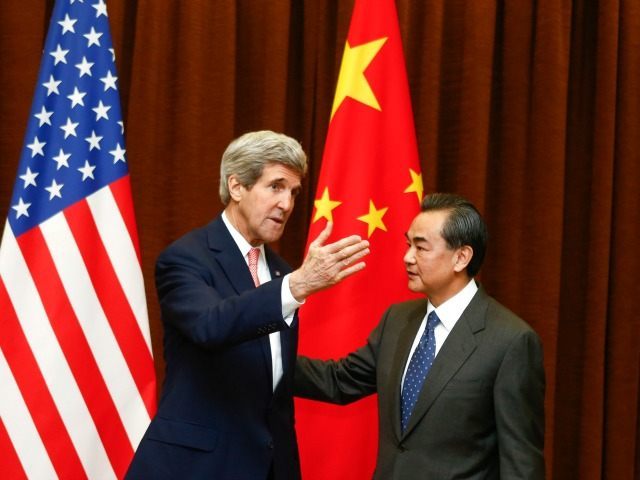Chinese Foreign Minister Wang Yi demanded Secretary of State John Kerry “respect China’s core interests” in the South China Sea following the presence of a B-52 bomber within 12 nautical miles of the Spratly Islands, a passage the Pentagon has branded unintentional.
“As the U.S. seeks cooperation with China, it ought to respect China’s core interests and important matters of concern,” Wang reportedly told Kerry in a phone call Monday, demanding America stop its “shows of force” in the South China Sea, referring to “freedom of navigation” exercises in which American ships and planes have peacefully transited through the region. According to U.S. State Department spokesman John Kirby, Kerry “made clear that, with respect to international law, we’ll fly, sail and operate our military assets where we need to” in his response.
The demand from Wang follows yet another complaint by the Chinese government that American military aircraft were spotted over international waters that China claims as its own, with no supporters in the international community. The latest mission China has objected to is the flight of a B-52 bomber within 12 nautical miles of the Spratly Islands, an archipelago claimed by the Philippines in which China has begun building artificial islands for landing strips and other military facilities. Unlike similar previous missions, however, the Pentagon claims it had no intention of flying near the islands this time around and blamed the appearance of American aircraft in the region on “bad weather.”
“For this mission, there was no intention of flying to within 12 nautical miles,” said Pentagon spokesman Cmdr. Bill Urban, confirming the Pentagon is “looking into the matter.”
The Chinese appear not to have accepted this explanation. “What the United States did was a serious military provocation, complicating the situation in the South China Sea, to the extent of militarizing it,” the Chinese Foreign Ministry said in a statement regarding the B-52.
Last week, before this excursion, Chinese Foreign Ministry Spokesman Hong Lei issued another statement affirming that “the construction activities that China undertakes on the stationed islands and reefs in the South China Sea fall completely within China’s sovereignty.” As no other nation agrees with China’s claims, the Chinese are currently fighting a case in the International Court of Arbitration at The Hague. The Hague determined earlier this year that it has jurisdiction to see the case, brought to the tribunal by the Philippines.
The Chinese military has also added a new missile destroyer to its fleet in the South China Sea.
The Pentagon’s denial of its intention to navigate within the South China Sea this week stands in stark contrast to previous statements in which the U.S. military has asserted its right to transit through international waters. In October, when the USS Lassen navigated within 12 nautical miles of the Spratly Islands, the Pentagon asserted its presence there as part of a “freedom of navigation” exercise. A few weeks later, Secretary of Defense Ashton Carter personally made the trip through the South China Sea on the USS Theodore Roosevelt with his Malaysian counterpart, Hishammuddin Hussein, asserting that America will “fly, sail and operate wherever international law allows.”
This month, the United States finalized a deal with Singapore that permits a P-8 Poseidon spy plane to park and fuel up on the island, allowing it easier access to the South China Sea. The Chinese government condemned the deal as “regional militarization” on the part of both Singapore and the United States.

COMMENTS
Please let us know if you're having issues with commenting.